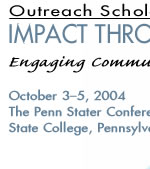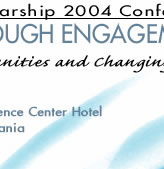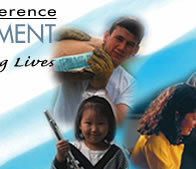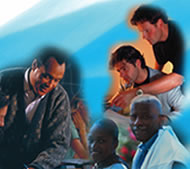Disciplinary
Matrices of Evaluation in Community-Based Research
Nancy
F. Pine, Student and Program Coordinator, Ohio State
University
Mindy Wright, Director of the Writing Workshop,
Ohio State University
To
begin a cross-curricular conversation about ways different
disciplinary research methods affect documenting impact,
we will describe a matrix of course and evaluation goals,
demonstrating how those goals correspond with chosen
research methods. Session participants will be invited
to develop and share similar matrices, as part of a
cross-disciplinary discussion.
Strengthening
Partnerships through WisLine Web
Erica
Kauten, Director, University of Wisconsin-Extension
Richard Berg, WisLine Web Trainer, University
of Wisconsin-Extension
The
Wisconsin Small Business Development Center (SBDC),
in its mission to advance entrepreneurs and economic
development, works hard to maintain essential relationships
with hundreds of statewide partners. WisLine Web, a
combination of telephone and Internet Web conferencing,
makes the SBDC's job easier by facilitating dynamic
dialogue and interactivity via distance technology.
Budget Crisis? How to Use Outreach Data to Tell the
Institution's Story
Diane
L. Zimmerman, Director, Administration and Advancement,
Michigan State University
Robert L. Church, Vice Provost Emeritus, Michigan
State University
Burton A. Bargerstock, Assistant Director, Research
and Technology, Michigan State University
Vivek Joshi, Information Technologist, Michigan
State University
In
times of fiscal restraint, outreach data can be used
to help tell an institution's story about its public
engagement. Workshop participants will explore methods
of using comprehensive data on faculty and staff outreach
activities for creating persuasive descriptions of an
institution's accomplishments in sharing knowledge resources
with external audiences.
Indigenous
Knowledges: Transforming the Academy
Audrey
N. Maretzki, Professor of Food Science and Nutrition,
Penn State
Ladislaus M. Semali, Associate Professor of Education,
Penn State
Indigenous
knowledges are to the ethnosphere what indigenous plant
and animal species are to the biosphere. Today, both
the ethnosphere and the biosphere are under threat of
a loss of diversity. In this workshop, participants
will learn about an unusually multicultural, multidisciplinary
conference, view a video highlighting some of the conferences'
unique features, and be encouraged to consider how indigenous
knowledges could transform their own institution.
Unlocking
the Resources of Higher Education for Child Care Professionals
in Georgia
Jan
Smith, Public Service Associate, University of Georgia
Nancy Thompson, University of Georgia
Child
care providers face barriers to continuing their education
including too little knowledge of how to unlock the
resources in journeying to their career goals. This
workshop is about opening the locked doors of higher
education through collaboration among those who care
about the child care provider and the child.
The
Community and Planning Context for Outreach Scholarship
Daney
Jackson, Director of Cooperative Extension, Associate
Vice President for Outreach, and Associate Dean in the
College of Agricultural Sciences, Penn State
Marilyn Corbin, Associate Director and State
Program Leader, Penn State Cooperative Extension
Theodore
R. Alter, Associate Vice President for Outreach
and Director of Cooperative Extension, Penn State Cooperative
Extension
Nancy Ellen Kiernan, Program Evaluator, Penn
State Cooperative Extension
Jack Watson, Associate Director and State Program
Leader, Penn State Cooperative Extension
Penn
State Cooperative Extension's new model for statewide
program planning is grounded in the logic modeling process.
This session will illustrate how the logic modeling
process is an organizational and leadership tool that
can lead to influencing outreach scholarship. Perspectives
on the model, strategies, and "best practices"
will be shared.
Ohio State University P-12 Project's Neighborhood
Schools Initiative: An Update Two Years Later
Nancy
Nestor-Baker, Director, P-12 Project, Ohio State
University
At
the 2002 Outreach Scholarship conference, the OSU P-12
Project's neighborhood schools initiative, "The
Learning Bridge," was featured. Since then, the
initiative has undergone significant leadership and
organizational changes. This session examines successes
and failures of the neighborhood schools initiative,
and draws conclusions about engaging high-need schools
close to home.
Implementing Stakeholder-Focused Program Needs Assessment:
The Good, the Bad, and the Questionable
Nancy
K. Franz, Associate Director, University of New
Hampshire
Lisa Townson, Cooperative Extension 4-H Youth Development Extension Specialist, University of New
Hampshire
Mutually
beneficial outreach programs require opportunities for
stakeholder input. Discover a stakeholder-focused program
needs assessment process implemented by the University
of New Hampshire Cooperative Extension. Participants
will explore the lessons learned from the process and
discuss implications for future efforts to involve stakeholders
in program planning.
Public Service Media as Service Learning
Bassam Shakhashiri, Professor of Chemistry,
University of Wisconsin-Madison
David DiBiase, Director of the John A. Dutton
e-Education Institute, Penn State
Richard Alley, Evan Pugh Professor of Geosciences,
Penn State
Sridhar Anandakrishnan, Associate Professor of
Geosciences, Penn State
Faculty are integrating public broadcasting technologies
and pedagogies into learning experiences for their students.
The Penn State faculty will address the goals, intellectual
and institutional contexts, and work plan of their Public
Service Media as Service Learning project. From the
University of Wisconsin-Madison, Professor Shakhashiri
will share his experiences with K-12 education and science
literacy.
Public
Scholarship and the Land-Grant Mission
Jeremy
Cohen, Associate Vice Provost for Undergraduate
Education and Professor of Communications, Penn State
Carol Colbeck, Director and Senior Research Associate,
Center for the Study of Higher Education, Penn State
Rosa Eberly, Associate Professor of Communication
Arts and Sciences, Penn State
Constance Flanagan, Professor of Agricultural
and Extension Education, Penn State
Patty Wharton Michael, Graduate Student, Penn
State
Nicole Webster, Assistant Professor of Agricultural
and Extension Education, Penn State
Lakshman Yapa, Professor of Geography, Penn State
Working
with the Kettering Foundation, members of Penn State's
Faculty Public Scholarship Associates have developed
a taxonomy of public scholarship. At Penn State, the
development of a curriculum of consequence through course
work, research, and the implementation of a new intercollege
minor in civic and community engagement supports the
conduct of teaching, learning, and performance as a
means through which students and faculty can view their
work, not as segregated from society but as the contributions
of scholar-citizens with membership in a larger community.
Members of the research group will share findings on
the place of student and faculty public scholarship
in the land-grant mission; unique developmentally based
opportunities for undergraduate participation; organizational
incentives and roadblocks to deep faculty participation;
the identification of useful and supportive scholarly
literature; and the assessment of public scholarship
outcomes.
Initiative-Based
Public Service and Outreach as a Means to Harness Expertise
across the Disciplines to Plan for Impact
Arthur Dunning, Vice President for
Public Service and Outreach, and Associate Provost,
The University of Georgia
Patricia (Trish) Kalivoda, Associate Vice President
for Public Service and Outreach, The University of Georgia
This
session will describe how the Office of Public Service
and Outreach at the University of Georgia (UGA), the
land-grant and flagship institution in Georgia, is working
to marshal the expertise of UGA's academic and public
service faculty to address issues critical to the state,
region, and world. The primary strategy is an initiative-based
approach. The session will outline UGA's current initiatives,
why these initiatives are important to Georgia, the
connections between the various initiatives, and, most
significant, how partnerships and collaborations are
being built among the various units on campus.
|





